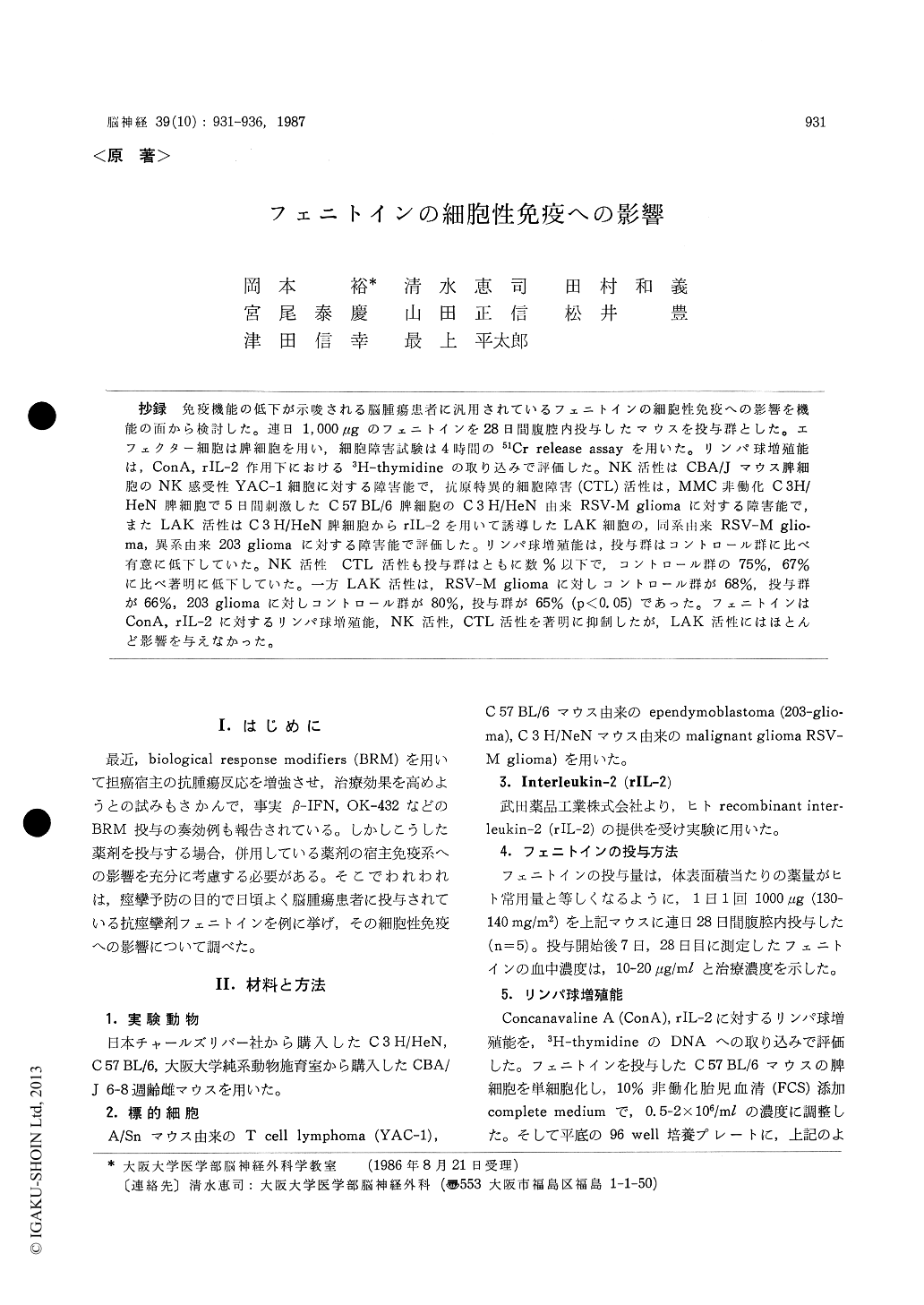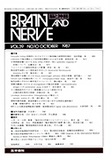Japanese
English
- 有料閲覧
- Abstract 文献概要
- 1ページ目 Look Inside
抄録 免疫機能の低下が示唆される脳腫瘍患者に汎用されているフェニトインの細胞性免疫への影響を機能の面から検討した。連日1,000μgのフェニトインを28日間腹腔内投与したマウスを投与群とした。エフェクター細胞は脾細胞を用い,細胞障害試験は4時間の51Cr release assayを用いた。リンパ球増殖能は,ConA,rIL−2作用下における3H-thymidineの取り込みで評価した。NK活性はCBA/Jマウス脾細胞のNK感受性YAC−1細胞に対する障害能で,抗原特異的細胞障害(CTL)活性は,MMC非働化C3H/HeN脾細胞で5日間刺激したC57 BL/6脾細胞のC3H/HeN由来RSV-M gliomaに対する障害能で,またLAK活性はC3H/HeN脾細胞からrlL−2を用いて誘導したLAK細胞の,同系由来RSV-M glio-ma,異系由来203 gliomaに対する障害能で評価した。リンパ球増殖能は,投与群はコントロール群に比べ有意に低下していた。NK活性CTL活性も投与群はともに数%以下で,コントロール群の75%,67%に比べ著明に低下していた。一方LAK活性は,RSV-M gliomaに対しコントロール群が68%,投与群が66%,203 gliomaに対しコントロール群が80%,投与群が65%(p<0.05)であった。フェニトインはConA,rlL−2に対するリンパ球増殖能,NK活性,CTL活性を著明に抑制したが,LAK活性にはほとんど影響を与えなかった。
Phenytoin is a highly effective anticonvulsant agent that is widely administrated to prevent some kinds of patients with brain tumor. But it has been said that phenytoin may have some immunosuppresive potential for hosts. In this study, we evaluated the effects of phenytoin upon cellular immunity such as NK, CTL and LAK activity in murine models.
Fresh splenocytes were taken out from mice (CBA/J, C3H/HeN, C 57 BL/6) into which pheny-toin had been injected intraperitoneally at a daily dose of 1,000 itg for 28 days. The serum concent-ration of phenytoin in the experimental models was 10-20 ug/ml. The cytotoxic activities were estimated by a 4-hr 51Cr release assay. The mito-gen-stimulated lymphocyte function was evaluated by 3H-thymidine incorporation into DNA.
The NK activity was estimated by cytotoxicity of splenocytes of CBA/J mice against NK-sensi-tive YAC-1 cells. The cytotoxic T-lymphocyte (CTL) activity was estimated by cytotoxicity of splenocytes of C 57 BL/6 mice which were stimu-lated in vitro for 5 days by splenocytes of C 3H/ HeN treated with mitomycin C, against RSV-M glioma cells. Lymphokine-activated killer (LAK) activity was estimated by cytotoxicity of LAK cells, which were induced from splenocytes of C 3 H/HeN mice by human recombinant interleu-kin-2 (rIL-2), against syngeneic RSV glioma and allogeneic 203 glioma cells.
3H-thymidine incorporation of splenocytes of C 57 BL/6 mice was reduced significantly (p<0.01) in phenytoin-treated mice. The cytotoxicity of splenocytes of non-treated CBA/J mice aginst YAC-1 cells was 75%, but that of phenytoin-treated CBL/J mice was a few %. And the cyto-toxicity of CTL induced from splenocytes of non-treated C 57 BL/6 mice against RSV-M glioma was 65%, but that of CTL from phenytoin-treated mice was a few %. Both NK activty and CTL activity were not induced from phenytoin treated mice. The cytotoxicity of LAK cells from pheny-toin-treated mice was not so significantly reduced, compared with normal mice. In conclusion, pheny-toin suppress lymphocyte responsiveness to conA and rIL-2, NK activity and CTL activity, but not LAK activity. These findings suggest that biological response modifiers (BMR) enhancing NK activity or/and CTL activity are not so effec-tive for the patients who are administrated with phenytoin, and that the adoptive immunotherapy with LAK cells are rather effective for such patients.

Copyright © 1987, Igaku-Shoin Ltd. All rights reserved.


